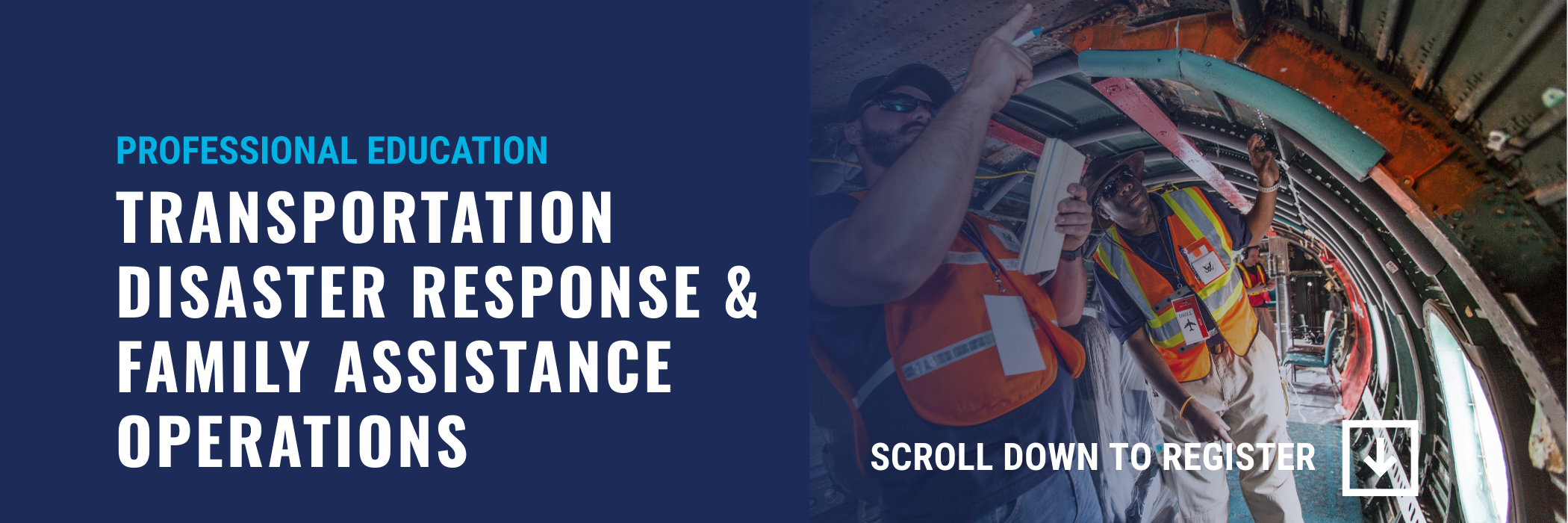Course Detail: TDAR - Transportation Disaster Response & Family Assistance Operations

Overview
How you respond to a transportation accident could lead your organization to a successful conclusion, or cause damaging setbacks. The Transportation Disaster Response and Family Assistance Operations Course, offered by Embry-Riddle Aeronautical University, will guide you through the preparation for a disaster involving the loss of life, the response to an event and recovery and the return to normal operation. Being prepared to assist those impacted by a disaster and understanding the roles of response partners are key components to effectively managing risk and ensuring business continuity.
You will hear from former senior National Transportation Safety Board responders, who have managed family assistance operations for every major US transportation accident from1997 to 2022. Using persona experience, case studies and extensive classroom discussion, the instructors examine best practices in family assistance response to help organizations understand the keys to success.
Laws & Acts
Several countries, including the US, have laws requiring government agencies and aviation operators to have plans ensuring effective support for family members impacted by fatal accidents. In the US, federal law requires major, regional, cargo air carriers, some business jet and air tour operators (FAA Part 121, 129, and some 135 operators), and passenger rail operators to have family assistance plans. These laws include:
- Aviation Disaster Family Assistance Act of 1996 (49 U.S. Code sections 1136 and 41113)
- Foreign Air Carrier Family Support Act of 1997 (49 U.S. Code section 41313)
- Rail Passenger Disaster Family Assistance Act of 2008 (49 US Code sections 1139 and 24316)
- ICAO Doc 9998, "ICAO Policy on Assistance to Aircraft Accident Victims and Their Families"
- Doc 9973, "Manual on Assistance to Aircraft Accident Victims and Their Families"
- Recommended Practice 8.46 of Annex 9 which encourages Contracting States to establish legislation, regulations, and/or policies in support of assistance to aircraft accident victims and their families
This course can be completed independently, or toward the Embry-Riddle Certificate of Management in Aircraft Accident Investigation.
Who Should Attend
Professionals working in various capacities across the transportation industry can benefit from this knowledge including:
- Individuals responsible for planning, training and preparedness in transportation organizations
- Representatives from local, state and federal agencies
- Non-profit organizations tasked with local response to disasters
- Emergency managers
- Disaster response professionals
- Safety professionals
- Public information officers
- Risk managers
Course Objectives
After completing this course, you will be able to demonstrate a comprehensive and broad-based understanding of:
- The legal aspects of disaster assistance - legislative responsibilities, ICAO guidance
- The NTSB and the accident investigation process
- Communicating effectively with grieving family members
- On-scene family assistance operations - the role of a coordinated operational response
- Importance of a coordinated forensic/victim identification operation
- Key tools for response personnel - how to be an effective responder
- Self-care and psychological first aid
Attendees Said ...
"This was a fantastic overview of disaster response, with the most substantial group of SMEs that I have the pleasure of learning from."
"I cannot believe how great, down to earth, knowledgeable and willing to share their experience was throughout this course. There was not a question that they left unanswered and offered REAL industry experience that I will ABSOLUTELY take back and implement at our organization." Dulce Lucero, Operations Training Coordinator, Daytona Beach International Airport
"There is no group better than the NTSB at collecting and disseminating complicated and emotional information to the grieving public and families. Access to Sharon, Paul and Robert is absolutely priceless. Their combination of depth of expertise and compassion made this entire course a once in a lifetime opportunity." Theresa Collington, Vice President, Tucker/Hall
Continuing Education Units (CEUs)
Embry-Riddle will award 2.1 CEUs to each attendee who successfully completes the course.
Registration Information
The preferred method of payment is credit-card at the time of registration. If you are paying by another method of payment (wire-transfer, employer voucher, check/PO), please 'Create Profile' from the left menu and then contact Daytona Beach ProEd to submit a registration request. Please note registrations are not guaranteed until payment is received in full.
Cancellation Policy
A cancellation charge of $150 will be assessed on any standard cancellations. A late cancellation charge of 25% of the course registration fee will be assessed on cancellations occurring within 14 days of the start of the course. For additional information, please review the detailed cancellation, deferment, no-show and refund policies.

 Cart (0)
Cart (0)